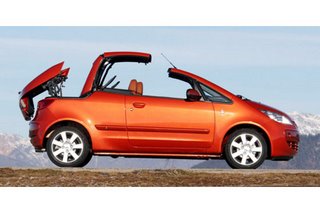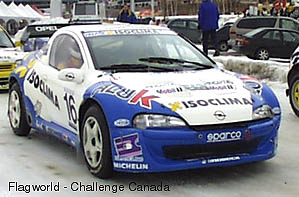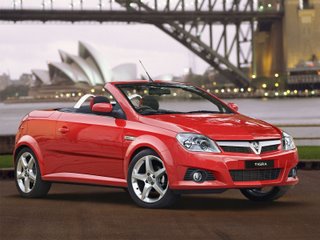




The Opel Tigra is a sports car produced by Opel (a subsidiary of General Motors Corporation) based on its Corsa supermini. It was originally available as a small coupé, produced from 1994 to 2000, with a new roadster model introduced in 2004. The Opel Tigra is sold in the UK as the Vauxhall Tigra, in Australia as the Holden Tigra, and was sold in Brazil and Mexico as the Chevrolet Tigra.The Tigra was based on the concept car of the same name and built on the platform of the second generation Opel Corsa. However, it shared no body panels with the model it was based on, and the interior layout was different too, with a 2+2 seating arrangement. The production vehicle was introduced at the 1993 Frankfurt Motor Show, with production starting in early 1994.
The Tigra was available with two petrol engines options, both from the Ecotec family, a more affordable 1.4 L with 90 PS (66 kW), and a larger sportier version, powered by the 1.6 L engine with 106 PS (78 kW), sourced from the Corsa GSi. Both wereDOHC 16 valve engines with electronic fuel injection. The smaller engine was available with an optional 4-speed automatic gearbox.
Added to the mass-market underpinnings was a suspension tweaked by Lotus. However, the car was overweight, with 150 kg (330 lb) over the equivalent engined Corsa models. Acceleration on the 1.6 L model was 10.5 seconds, one second slower than the Corsa GSi. However, a higher top speed of 203 km/h (126 mph) compensanted for its acceleration troubles. This speed increase was obtained thanks to the higher gear ratios, a lower drag coefficient of 0.31, and standard 15" wheels on the more powerful model.
The car was imported by Chevrolet and sold as the Chevrolet Tigra in Brazil and Mexico, and as the Vauxhall Tigra in the United Kingdom.
Brazilian Chevrolet Tigra depicting Chevrolet's emblem
The Brazilian Chevrolet Tigra was imported only for a few months, between late 1998 to early 1999, due to a sudden depreciation of the Real, which forced General Motors do Brasil to end importation. Only the 1.6 L model was imported, detuned to 99 PS (73 kW) for tax purposes. The 15" wheels were also exchanged for more affordable 14" wheels. After an absence of a four years, Opel resurrected the Tigra nameplate in 2004 for a new sports car based on the Corsa C. The Tigra Twin Top, as it was called, is a 2-seater coupé convertible with a retractable hardtop in the fashion of the Peugeot 206 CC. The Tigra is produced by French coachworks Heuliez.
Like its predecessor, the Tigra Twin Top is available with two petrol-powered engines. The base model uses the 1.4 L engine with 90 PS (66 kW), but now from the Twinport family, different from the previous generation's 1.4, while the top of the range uses the Ecotec 1.8 L from the Corsa GSi, with 125 PS (92 kW). An economic version, using Fiat's Multijet 1.3 Diesel engine, was introduced in 2005.
The second generation is marketed in Australasia as the XC-series Holden Tigra, only with the 1.8 L engine.
The Tigra was available with two petrol engines options, both from the Ecotec family, a more affordable 1.4 L with 90 PS (66 kW), and a larger sportier version, powered by the 1.6 L engine with 106 PS (78 kW), sourced from the Corsa GSi. Both wereDOHC 16 valve engines with electronic fuel injection. The smaller engine was available with an optional 4-speed automatic gearbox.
Added to the mass-market underpinnings was a suspension tweaked by Lotus. However, the car was overweight, with 150 kg (330 lb) over the equivalent engined Corsa models. Acceleration on the 1.6 L model was 10.5 seconds, one second slower than the Corsa GSi. However, a higher top speed of 203 km/h (126 mph) compensanted for its acceleration troubles. This speed increase was obtained thanks to the higher gear ratios, a lower drag coefficient of 0.31, and standard 15" wheels on the more powerful model.
The car was imported by Chevrolet and sold as the Chevrolet Tigra in Brazil and Mexico, and as the Vauxhall Tigra in the United Kingdom.
Brazilian Chevrolet Tigra depicting Chevrolet's emblem
The Brazilian Chevrolet Tigra was imported only for a few months, between late 1998 to early 1999, due to a sudden depreciation of the Real, which forced General Motors do Brasil to end importation. Only the 1.6 L model was imported, detuned to 99 PS (73 kW) for tax purposes. The 15" wheels were also exchanged for more affordable 14" wheels. After an absence of a four years, Opel resurrected the Tigra nameplate in 2004 for a new sports car based on the Corsa C. The Tigra Twin Top, as it was called, is a 2-seater coupé convertible with a retractable hardtop in the fashion of the Peugeot 206 CC. The Tigra is produced by French coachworks Heuliez.
Like its predecessor, the Tigra Twin Top is available with two petrol-powered engines. The base model uses the 1.4 L engine with 90 PS (66 kW), but now from the Twinport family, different from the previous generation's 1.4, while the top of the range uses the Ecotec 1.8 L from the Corsa GSi, with 125 PS (92 kW). An economic version, using Fiat's Multijet 1.3 Diesel engine, was introduced in 2005.
The second generation is marketed in Australasia as the XC-series Holden Tigra, only with the 1.8 L engine.
No comments:
Post a Comment